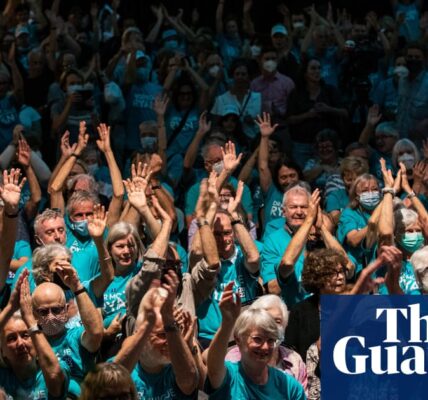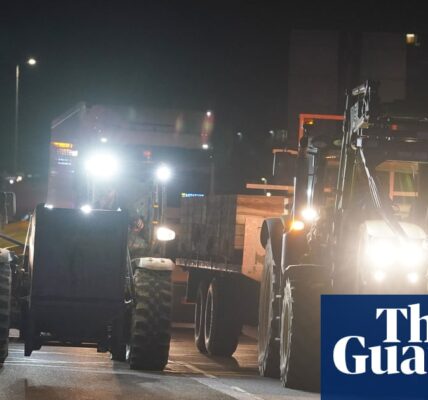‘I’ve seen things no one should go through’: the overwhelming scale of loss in Brazil’s floods
As the rain poured down during the night of 3 May, a stream of people began to arrive at the Lutheran University of Brazil in Canoas, a city in the southernmost state of Brazil, Rio Grande do Sul. For a week, heavy rains had been pummelling the landscape, raising river levels and flooding homes, forcing many to seek shelter elsewhere.
Three weeks later, the university harbours thousands of people and is the largest camp for the displaced amid a growing humanitarian crisis in the state of 10 million inhabitants. More than 580,000 people have been displaced, with almost 70,000 of them depending on shelters, according to a state government report. A total of 2.3 million people have been affected by the torrential rain and floods.
City, state and federal governments are working to provide assistance, but the authorities estimate that the situation will take months or even years to return to normal. More than 90% of Rio Grande do Sul’s 497 municipalities have been affected, with 418 declaring a state of emergency or disaster.
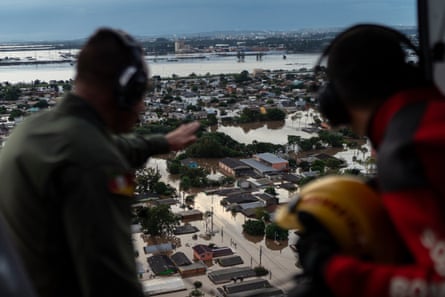
In Canoas, more than 100,000 of its 347,000 inhabitants have been displaced, according to city officials. A stroll through the university buildings reveals tents made using goalposts, families and pets crammed into all corners, children playing, long queues for the bathrooms and people praying in the hallways.
Juan Romero, a 54-year-old carpenter who migrated from Venezuela, arrived at about 8pm on 4 May with his nieces and nephews after helping to rescue a number of people in the neighbourhood of Mathias Velho. He had only managed to grab his work and migration papers before his home was quickly flooded.
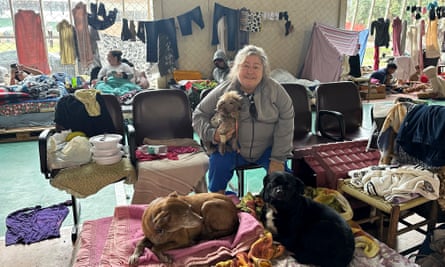
“I’ve seen things that no one should go through as a human being. I’ve seen people surrounded by children searching for refuge,” he says. “Maybe some died like this.”
Claudia Duarte, 59, went up to the second floor of her house, betting the water wouldn’t get there – as many people did. By the time she was saved, it had already reached her waist. “Outside, it was like a wide sea covering every roof. I had already recorded a video saying goodbye to send to people,” she says.
Nearly 98% of the city of Eldorado do Sul was flooded, displacing almost the entire population to neighbouring towns. With the water receding in some areas, driving through the city streets feels like moving through a giant junkyard, with piles of furniture, clothes, appliances and personal items mounting up on pavements, and ruined cars everywhere.
The highway into the city, which passes over the islands of the neighbouring state capital, Porto Alegre, is peppered with people living in their cars and in improvised tents by the side of the road, resembling refugees in a war zone. One man says he has been living in his car with his five dogs for three weeks because no shelter would accept all of them.
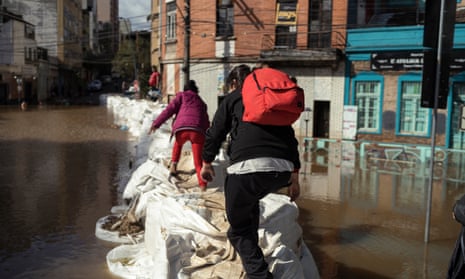
In Porto Alegre, William Santos, a 29-year-old human resources analyst, has volunteered to take his neighbours in the Serraria neighbourhood across flooded areas in a small boat. As he is in constant contact with contaminated water, health workers have given him and other volunteers vaccines and medicines to prevent diseases such as leptospirosis.
In his community, surrounded by the Guaíba River, those whose houses have not flooded have had no electricity for almost three weeks. They rely on army trucks to carry them through the flooded areas to where they can then catch buses to their relatives’ homes, take hot showers and charge their phones.
The region has seen floods before, but nothing like these, residents say. Vagner Thier, a 39-year-old private security guard and jiujitsu instructor, says the water has never before come near his house, which has an open back yard facing the river. This time, it started to flood in through the indoor drains. In a street nearby, houses were dragged away by the waters. “It’s beautiful here, but the view turned into endless water,” he says. “It does make you afraid now. I’m talking to my wife about moving out.”
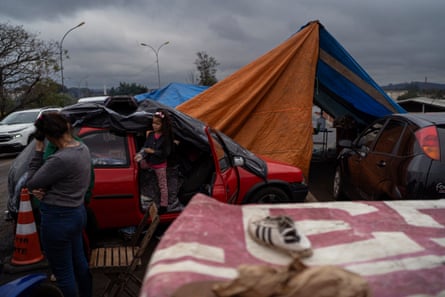
While the storms caused extreme flooding in the greater Porto Alegre area, in the countryside, the river’s currents wiped entire districts of the municipalities Cruzeiro do Sul, Muçum, Lajeado, Estrela, Encantado, Roca Sales, and Arroio do Meio off the map, in a scenario reminiscent of the passage of a devastating hurricane.
Carlos Machado, a public health researcher from the Oswaldo Cruz Foundation (Fiocruz) and an expert in disaster responses in Brazil, is part of the group advising the health ministry. With a minimum of 161 fatalities reported statewide, he says sanitary conditions have worsened as the waters have retreated, leaving behind thick, contaminated mud and extensive debris. The arrival of colder temperatures is also causing a surge in respiratory ailments and viruses.
“The extent of this disaster, in terms of geographical reach and number of people affected, is truly terrifying and shocking. We’ve never had an event in Brazil with almost 80,000 people [in shelters],” says Machado. “It’s a continuous disaster that lasts, with risks of more rain and cold temperatures. We’re fighting against time, and it never ends.”
According to the Observatório das Metrópoles, part of Brazil’s National Institute of Science and Technology (INCT), this is a climate justice crisis, as low-income areas – which are least responsible for the emissions that cause global heating – have experienced the worst of the floods.
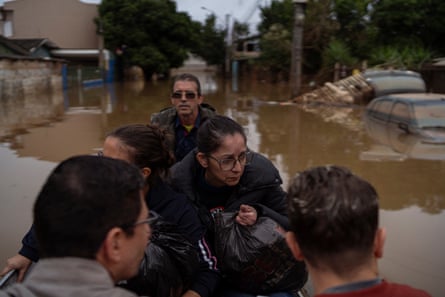
“Rio Grande do Sul is a raw state warning of climate change,” says Marcio Astrini, executive secretary of the NGO Climate Observatory. “You had droughts in 2021 and 2022, started 2023 with one, with a significant crop failure, losses mounting to billions, and ended the year under the water. And now the worst event ever.
“We didn’t need to pay for this lesson with lives. Now let’s at least honour these people by changing our rulers’ behaviour.”
Astrini says Brazilian politicians still do not take the environmental agenda seriously. In an interview with Folha de S Paulo, the state governor, Eduardo Leite, acknowledged that his administration had other priorities, such as the state’s fiscal crisis. He also said not every alert is justified by subsequent weather conditions.
“The most responsible agenda is not always the most popular one – and we should have learned that during the Covid-19 pandemic,” Astrini says. “These people were elected to be responsible. They need to listen, take action, and believe in what science says.”
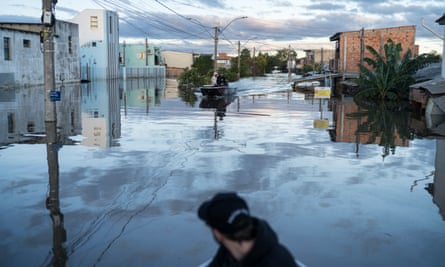
The state government does not yet know the economic impact of the disaster, which has hit both small businesses and major industries, and destroyed farming areas. A union for the industrial sector, Fiergs, estimates that 94% of economic activity was affected in regions where 95% of the state’s industries are located. It has asked the federal government for an aid package of 100bn reais (£15bn).
Fernando Fan, a professor at the Hydraulic Research Institute at the Federal University of Rio Grande do Sul, says prevention is critical. A study ordered by the National Water Agency suggests that every real invested in alert systems for climate events such as droughts and floods would save 661 reals (£100).
“Perhaps an obstacle to having more investments in disaster prevention is that many leaders do not see it as an advantage from an economic point of view,” says Fan. “But every penny invested in adaptation brings economic benefit. It’s economically indisputable, without even mentioning lives saved.”
Ernani Gonçalves, the mayor of Eldorado do Sul, whose own house was flooded and is now living in his office on City Hall’s third floor, says he feels unsure about the future.
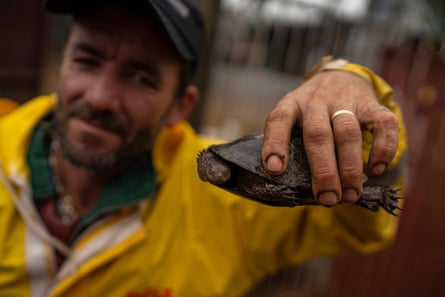
“We don’t know what will happen in 30, 60 days from now. We had meetings with the governor and the president [Luiz Inácio Lula da Silva], and they indicated there would be humanitarian aid, but we’re now dealing with thousands of people without food, housing, mattresses to sleep, and depending on donations,” Gonçalves says. “My job now is opening bills. How will we pay for it? I don’t know.”
Source: theguardian.com
